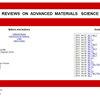基于设计孔隙率和水灰比的透水混凝土强度预测研究
IF 3.6
4区 材料科学
Q2 MATERIALS SCIENCE, MULTIDISCIPLINARY
引用次数: 0
摘要
由于多孔结构,透水混凝土的强度预测很难用于混合设计。这项工作研究了水灰比对水泥浆流动性、粘度和力学性能的影响。然后,研究了不同孔隙率的透水混凝土的孔隙率、渗透性和抗压强度,并对试验结果进行了拟合和分析。结果表明,随着水灰比的增加,水泥浆的粘度降低,流动性增加。水灰比与净浆强度呈负线性关系。随着水灰比的变化,透水混凝土的孔隙率和渗透性也按照同样的规律波动。设计孔隙率不同的透水混凝土的抗压强度最初会增加,然后随着水灰比的增加而下降。根据线性拟合分析,当水灰比不变时,透水混凝土的渗透性和抗压强度分别与设计孔隙率呈正负线性关系。通过对拟合结果的分析,结合透水混凝土的体积法,提出了预测透水混凝土强度的配合比设计计算方法。本文章由计算机程序翻译,如有差异,请以英文原文为准。
Research on the strength prediction for pervious concrete based on design porosity and water-to-cement ratio
The strength prediction of pervious concrete is hard to implement for the mix design due to the porous structure. This work studied the influence of the water-to-cement ratio on the fluidity, viscosity, and mechanical properties of cement paste. Then, the porosity, permeability, and compressive strength of the pervious concrete with various porosities were investigated, and the test results were fitted and analyzed. The result indicates that as the water-to-cement ratio increases, the viscosity of the cement paste reduces and the fluidity increases. The water-to-cement ratio has a negative linear relationship with net slurry strength. The porosity and permeability of pervious concrete fluctuate in accordance with the same rule as the water-to-cement ratio changes. The compressive strength of pervious concrete with varying design porosities increases initially, then declines as the water-to-cement ratio rises. According to the linear fitting analysis, when the water-to-cement ratio is constant, the permeability and compressive strength of pervious concrete have a positive and negative linear relationship with the design porosity, respectively. By analyzing the fitting results and combining the volume method of pervious concrete, a calculation method for mix proportion design is proposed to predict the strength of pervious concrete.
求助全文
通过发布文献求助,成功后即可免费获取论文全文。
去求助
来源期刊

Reviews on Advanced Materials Science
工程技术-材料科学:综合
CiteScore
5.10
自引率
11.10%
发文量
43
审稿时长
3.5 months
期刊介绍:
Reviews on Advanced Materials Science is a fully peer-reviewed, open access, electronic journal that publishes significant, original and relevant works in the area of theoretical and experimental studies of advanced materials. The journal provides the readers with free, instant, and permanent access to all content worldwide; and the authors with extensive promotion of published articles, long-time preservation, language-correction services, no space constraints and immediate publication.
Reviews on Advanced Materials Science is listed inter alia by Clarivate Analytics (formerly Thomson Reuters) - Current Contents/Physical, Chemical, and Earth Sciences (CC/PC&ES), JCR and SCIE. Our standard policy requires each paper to be reviewed by at least two Referees and the peer-review process is single-blind.
 求助内容:
求助内容: 应助结果提醒方式:
应助结果提醒方式:


